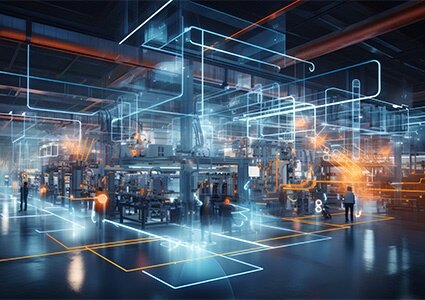
Scott Figura of LineView Solutions shares smart factory solutions and operational expertise to drive best production, every day
Can we start with an introduction to you, your career history, and how you came to be Managing Director of the Americas at LineView?
With an educational background in industrial engineering and initial experience as an officer in the US Navy, I transitioned into the manufacturing industry, assuming various leadership roles. Over my 30-year career, I’ve had the privilege of working with both large and small brands in both the public and private sectors, gaining an extensive understanding of the intricacies of the fast-moving consumer goods industry.
I’ve held several key operational roles including Chief Operating Officer, Senior Vice President of Operations, and Senior Vice President of Supply Chain. Outside of my work, I take great pride in my role as a volunteer mentor to military veterans transitioning to civilian careers, which has been a fulfilling commitment for the past decade.
My most enjoyable endeavour to date was when I was the Supply Chain Development & Operational Excellence Lead at Coca-Cola International. My focus was on cultivating organizational excellence through robust people development and the implementation of sustainable business solutions. This is where I had my first exposure to the LineView solution and its positive operational impact for the bottlers.
Having started my role at LineView Solutions as the Managing Director for the Americas in August this year, I am looking forward to playing a key role in the company’s ambitious growth trajectory, advocating for our brand, fostering strategic partnerships, and solidifying our presence in the Americas market. It’s an exciting opportunity to contribute to the success of LineView Solutions and the advancement of the manufacturing industry as a whole.
What aspect of the business do you enjoy the most and why?
I enjoy seeing the tangible impact our software has on our manufacturing clients. There’s nothing more rewarding than getting firsthand feedback from a customer about how our real-time production insights helped them increase yield, reduce downtime, or improve quality control. It’s rewarding seeing our technology drive optimization on the plant floor and knowing those efficiency gains translate to bigger profits and faster growth.
At the end of the day, our job is to help customers maximize their existing assets to unlock their true potential. Being a part of delivering on that promise is what I enjoy most about LineView.
What are the biggest changes that you have seen in recent years?
One of the biggest changes in manufacturing has been the acceleration towards smart factory initiatives. Companies are aggressively digitizing operations and implementing advanced technologies like AI and automation. This digital transformation is being driven by a need for greater efficiency, quality, and flexibility in the face of rising costs and unpredictable supply chains. Manufacturers know they need next-gen solutions to stay competitive.
Besides, the widespread skills gap means that talent shortages are hindering growth. Companies need to invest more in upskilling their workforce with digital and data-driven capabilities. The playing field has changed and closing the skills gap is now business critical. Having the right culture and training initiatives will support manufacturers to develop their people to complement innovation investments. Furthermore, simple to use solutions with an intuitive user interface like ours makes transitioning to a digital platform far simpler.
Could you elaborate on LineView’s advanced software and consulting services offering?
Our advanced manufacturing analytics software provides unparalleled visibility into production processes. We capture and analyze sensor data, video feeds, and operational metrics in real-time to identify inefficiencies, quality issues, and throughput bottlenecks. Our intuitive dashboards and visualization tools make it easy to pinpoint problems and opportunities.
Our expert consultants work side-by-side with clients to implement our solutions through a proven approach. We start with mapping the current state of affairs, then use our analytics to simulate future state scenarios and quantify ROI. Once deployed, we continue monitoring to refine and optimize the customer operations.
 What benefits have your clients experienced since partnering with LineView?
What benefits have your clients experienced since partnering with LineView?
We’ve seen clients optimize their asset utilization, leading to remarkable improvements in productivity and overall efficiency, which in turn has enabled them to defer capital expenditure, for example a new site, and therefore allocate resources more effectively to support growth.
Our solutions have consistently resulted in substantial reductions in waste, delivering not only cost savings but improving sustainability metrics – which is high up the agenda for businesses today, especially those operating with considerable volumes of product. We also see improved water ratios and reductions in energy usage, all of which go toward supporting companies’ environmental goals, and overall ESG targets.
LineView’s implementation has also resulted in a more engaged and empowered workforce, fostering a culture of continuous improvement and supporting employee retention.
What would you say are the biggest challenges facing the manufacturing industry, and what strategies do organizations need to ensure are in place to tackle them?
The manufacturing industry is facing escalating costs associated with crucial inputs such as labor, utilities, materials, and ingredients. To effectively navigate this landscape, organizations must focus on streamlining processes, enhancing operational efficiency, and minimizing resource wastage.
Manufacturing leaders must proactively seek innovative strategies to mitigate the impact of rising costs, by exploring avenues for sustainable sourcing, energy-efficient technologies, and optimized supply chain management.
Organizations must develop resilience in their systems, processes and in their people to build a culture of continuous improvement that’s ready to face dynamic market fluctuations.
What should be top of the agenda for manufacturing leaders today?
Manufacturing leaders must deepen operational understanding, embrace digital transformation, and develop a skilled workforce to be successful in today’s rapidly changing world.
By understanding their businesses inside and out, including their strengths, weaknesses, opportunities and threats, leaders can make better decisions about where to invest and how to compete. Embracing digital transformation by investing in technologies such as artificial intelligence (AI), machine learning (ML), and internet of things (IoT) can automate processes, improve efficiency, and create new products and services. Investing in training and development to ensure that employees have the skills they need to succeed in the digital age is essential, as the manufacturing industry faces a skills shortage.
By focusing on these three areas, manufacturing leaders can position their businesses for long-term success.
Is there anything else you’d like to add?
Prioritize your actions. Not all challenges are created equal. It is important to prioritize your actions so that you are focusing on the challenges that will have the greatest impact on your business.
Align your team. Once you have prioritized your actions, you need to align your team around them. This means communicating your vision and goals to your team members and getting them all on the same page.
Improve a little every day. Focus on making small, incremental improvements every day. Over time, these small improvements will add up to big results! ■